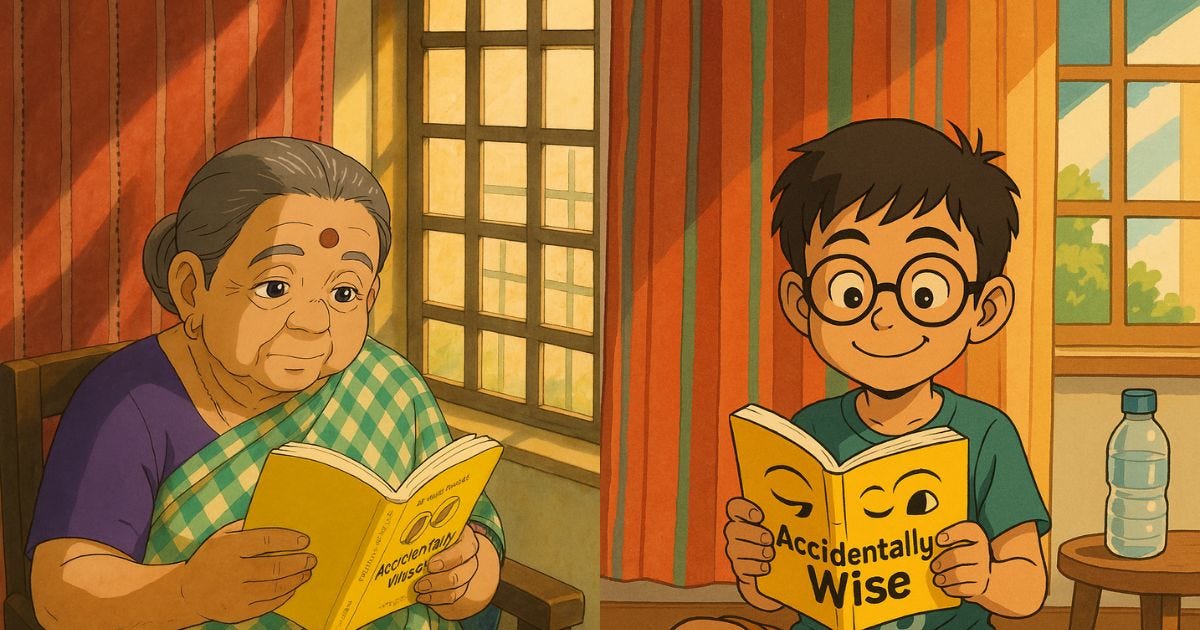When I sat down to write Accidentally Wise, I had a very specific reader in mind. Possibly juggling life goals, laundry, and a forgotten cup of chai somewhere in the house, or at work. Definitely someone who buys motivational Post-its and promptly forgets where they stuck them.
And to my relief, those readers—the original target audience—are loving it. They are writing in with notes like, “This feels like my brain wrote it, only better dressed,” and “Finally, a book that admits everyone is winging it.” Which is exactly the energy I hoped to tap into.
What I did not expect, however, was this: the youngest known reader is nine, and the oldest is ninety-two.
Neither of them featured in the original launch plan, which mostly involved writing lists of things to do and then re-writing them in better fonts.
A blessing from 92 and a bald joke for the ages
Let me clarify. The 92-year-old did not highlight a specific essay or spill tea on her cat if she has one (though I maintain that is statistically inevitable for someone, somewhere). She simply said, “I love what I am reading. God bless you.”
No notes. No literary critique. Just warmth, clarity, and gratitude. The kind of message that makes you sit quietly for a moment and wonder if you accidentally wrote something worth passing on.
The nine-year-old, on the other hand, was very specific. He liked the part where I confessed that karma caught up with me for making fun of my uncle’s hairline. “Finally, something fair,” he declared. I suspect he rereads that section whenever his homework feels unjust.
Curiosity, it turns out, has no expiry date
I did not intend to write a book for grandparents and pre-teens alike. But curiosity seems to ignore market segments. Kids are full of it. Older folks never let go of it. And everyone in the middle simply renames it “productivity” or “problem-solving” to sound more employable.
The essays in Accidentally Wise are not about having answers. They are about asking questions badly, laughing at the results, and occasionally learning something surprising in the aftermath. Nine-year-olds read it and think, Wait, adults mess up too?
Ninety-two-year-olds read it and think, Of course we do. Welcome to the club.
Universal weirdness is surprisingly…universal
It turns out that no matter how many candles are on your birthday cake, or how many you quietly omit, everyone is baffled by the same things.
We all press buttons harder when they are not working. We all talk to inanimate objects like they owe us rent. We all pretend to understand forms, instructions, and policies we clearly do not. And we all believe, deep down, that this time the app update will solve everything. (It will not.)
Confusion, it seems, is the one language we are all fluent in.
A voice that does not pretend to know everything
I never claimed to be wise. If anything, the title Accidentally Wise was meant to lower expectations. What you will find in the book is not sage advice. What you will find is someone trying things, often failing, sometimes learning—and almost always telling the truth about it.
Like buying a telescope for intellectual reasons and then using it mainly as a prop. Or creating a four-week diet chart that looked amazing in Excel but was promptly ignored in real life. Or testing the foam dynamics of shampoo mixed with toothpaste. (Results: inconclusive. Regret: immediate.)
Apparently, that kind of honesty appeals across generations. Readers, young and old, seem to appreciate that someone out there is willing to document their chaos without trying to spin it into a TED Talk.
Why it works for nine and ninety-two
If I had to guess why Accidentally Wise spans such an unlikely range, here is what I would offer:
The humour and situations in the book laugh at life’s absurdities - not at people. It includes everyone in the joke without making anyone feel like the target. The stories focus on being human rather than being polished. Whether it is a school project gone wrong or a mid-career existential wobble, the feelings land.
Curiosity runs through every chapter, and that energy seems to draw in readers of all ages who recognise the thrill of asking “What if?” and the humility of not having a neat answer. And the tone? It is more like a friend who turns up with snacks and honest stories than someone lecturing you with a five-step plan for better living.
Maybe that is the secret. Accidentally Wise is not a book about being right. It is a book about being curious.
And it turns out, curiosity connects people far more than age ever could—whether you are doing homework or managing blood pressure meds, dreaming about the future or quietly laughing at the past.
If you have read Accidentally Wise, I would love to hear, here, what you thought—bonus points for a picture or video!





